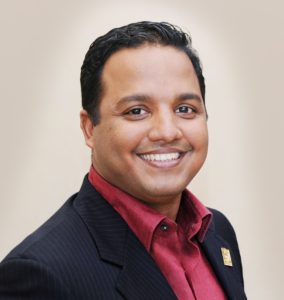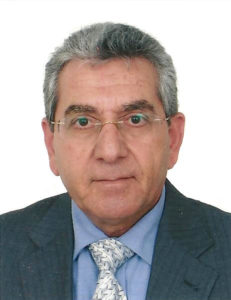Surendar Balakrishnan, Editor, Climate Control Middle East on October 31, chaired a session on cold chain during the 12th International Food Safety Conference held from October 29 to 31, in Dubai. Hannah Jo Uy covered the discussion, which revolved around transport refrigeration and cold storage facilities…

Bobby Krishna T M, Senior Specialist, Food Permits and Applied Nutrition Section, Dubai Municipality
Underlining the vital role the cold chain plays in enhancing food safety, quality and security, Bobby Krishna T M, Senior Specialist, Food Permits and Applied Nutrition Section, Dubai Municipality, kicked off the breakout session on cold chain by providing an overview of the Food Watch Programme and the importance of incorporating data points related to transport refrigeration and cold storage. The aim of Food Watch, Krishna stressed, is to connect every possible element that can influence food safety into a digital platform, including the first registration of cold store warehouses and any equipment that goes into it. If a warehouse is supplying food to a business, he said, the business can verify and report it, which is recorded and enters the Municipality’s database. This, Krishna said, allows the Municipality to monitor trends, identify potential problems related to a particular vehicle or build and manage possible food-related outbreaks.
That being said there are still gaps Krishna said that need to be filled. With this in mind, Krishna invited stakeholders to invest their time and provide recommendations to improve the current cold chain infrastructure. “The aim of the session,” he said, “is to take concrete messages, put them into legislation, look at what we can do on how to improve and bring that thinking into the Food Watch platform to make it more supportive. We look forward to see what we can do to make things better in Dubai.”

Dr Rafiq Alkhatib, Managing Director, RMK,
Taking a cue from Krishna’s words, Dr Rafiq Alkhatib, Managing Director, RMK, spoke on existing infrastructure by emphasising that a vehicle for food transport is, essentially, a portable cold store, designed with the specialised function of ensuring food safety and quality by securing the climate.
“When I say climate, I speak about temperature, air circulation, humidity and light,” he said. “If I keep a cooling unit in front, and chilled air [is not reaching the back] it is not a cold chain unit. It is something blowing cold air, and if you open the door, the hot air comes again, and we are in a vicious cycle.”

Kiran Bidappa, Commercial Manager – Frigo, Gorica
Kiran Bidappa, Commercial Manager – Frigo, Gorica, echoed the problem of air flow distribution in transport refrigeration, or lack thereof, emphasising that parameters for proper air distribution vary depending on the type of load, how it is packed, and whether the products in the pallets are frozen or chilled, among other considerations. Unfortunately, Bidappa said, overloaded trucks with bad air flow design, compromising the temperature and quality of the goods, are prevalent in the industry today.
Another issue Bidappa touched on is air migration, when doors of trucks are left open. A designated truck part of the cold chain distribution, he said, will have plenty of starts and stops, with no temperature recovery, which, again, compromises the produce.

Brian Suggitt, MD,
Systemair
Brian Suggitt, Managing Director, Systemair, and Chairman, Eurovent Middle East, shared a similar observation: “I watched one delivery truck, where the driver opens the back door, puts the strip curtain on top and leaves the door open for 20 minutes. That food is deteriorating in that period for time, when it’s 40 degrees C outside.”

Fabian Bahlmann, General Manager, Schmitz Cargobull Middle East
Fabian Bahlmann, General Manager, Schmitz Cargobull Middle East, said he believes this is an issue of behaviour among fleet operators, highlighting the value of conducting the necessary quality training. “The equipment can be good,” he said, “but with the wrong practice of people who load semi-trailers, everything can be damaged.”
Dr Alkhatib also considered this a niggling problem. In chiller rooms, he said, the door can be closed a particular way, and the issue can be addressed by air curtains preventing hot air from getting in. If installed in trucks, he said, an air curtain would mean that a truck’s open door would not affect the temperature, as it will prevent hot air from entering. “Why don’t we stop this?” Dr Alkhatib asked. “This plastic will not do.”
Suggitt admitted that in cold stores, this air migration can immediately lead to ice build-up, frost and condensation, “which not only damages the inside of the cold storage facility but damages the food, as well”. However, Suggitt added that it is not as easy to install air curtains in transport refrigeration vehicles. “There is much more limitation on space, height is a problem, you have to give the correct air flow, work with minimal electrical supply and take into consideration internal temperatures,” he said. Emphasising that “the industry is crying out” for such a solution, Suggitt said that Frico, under Systemair, is well advanced into developing a prototype that it hopes to introduce to the market by early next year. “It is something that will make massive improvement,” he said, “as air curtains would take out the user; you don’t get the peaks and troughs with strip curtains, which are also unhygienic and stop visibility.”
Hygiene is another point that Bidappa touched on, stressing that the industry is not at the level it should be, when it comes to employing the stricter controls on hygiene levels of food transport refrigeration vehicles.
The silver bullet: Data and impact of emerging technologies
Whether in the field of monitoring behaviour or installed equipment, digital platforms and emerging technologies are identifying more data points to enhance market intelligence. Krishna added that a number of disruptive changes have emerged and that many companies have showcased remarkable progress, not only in the technology they offer but also in how data is being handled.

Bjorn Ostbye, Manager – Project Development, Lulu Group International
Bjorn Ostbye, Manager – Project Development, Lulu Group International, provided an insight into the company’s increasing reliance on data to ensure quality of their products and the emphasis made on training employees in cold stores. Speaking on the degree of attention the company implements in securing the cold chain, Ostbye said that temperature-sensitive products, such as ice cream, are closely monitored through Wifi sensors that can be used for temperature reading to ensure quality from the moment it leaves the factory, until a consumer entering the hypermarket picks it up.
Weighing in on the importance data plays in creating greater transparency, Bahlmann pointed to how data from the axle, with the right telematics, can identify if goods have been loaded and unloaded out of schedule during transit, which can be made visible to the driver, fleet operator and end user. The value, he said, is the full integration of data throughout the process, which can be generated in reports and could be linked to the Food Watch programme. Bidappa seconded this, adding that data recorders are the best option for monitoring temperature from point of delivery to distribution, to assess number of door openings, how long cooling has been turned off and to record cooling.
For Dr Alkhatib, it is imperative that vehicles should contain sensors, via IoT or otherwise, to monitor proper air distribution, and that even flow and temperature is maintained. “We need to have great effort to link this vehicle to the Food Watch, in my opinion,” he said.

Amir Naqvi, Regional Marketing Leader, Honeywell Fluorine Products
Highlighting IoT-based solutions for cold storages and supermarkets, Amir Naqvi, Regional Marketing Leader, Honeywell Fluorine Products, Middle East, Turkey and Africa, said the company is leveraging its expertise on heat transfer to translate the large amounts of data into a simple analysis for operation managers to bring more value to end users and bring more accountability to stakeholders in the value chain.
Custom-tailored regulation to address the GCC region’s unique conditions
Regulation, Bahlmann stressed, is the way forward in this regard, especially with the current situation related to hygiene in trucks, which, he said, is unacceptable. Bahlmann pointed to stipulations under the Agreement on the International Carriage of Perishable Foodstuffs and on the Special Equipment to be used for such Carriage (ATP) as a starting point. In Europe, Bahlmann said, the trucks are certified for six years, as per regulations taking into account different types of temperature levels under which different types of goods are to be transported. After this period, he explained, the trailer or truck body gets audited and, if approved, it can be driven for 3-4 years more. If not, it cannot be used for food transportation. Age is not the only indication of quality, he said, as it is also dependent on how the assets are used and the manufacturing technology behind it. “Being an international manufacturer, we follow international guidelines with production technology, in line with HACCP,” he said. “This practice is discussed with fleet operators and food manufacturers to ensure processes and vehicle solutions are in place, in line with local and regional legislation.”
Bahlmann said that a lot of learnings can be gleaned from best practices implemented abroad, which can be adjusted to cope with regional conditions, following advisement of UAE specialists. Bidappa said that he believes the UAE government should spearhead its own regulations, contact other governments and take suggestions from them. “I think it’s better and faster to adopt our own legislation here and bring our own programme to certify trailers and trucks,” he said.
Krishna said that there are many angles to consider on the development of regulations. Currently, he said, much of the work with data is done post-mortem, and there is need for more real time interaction.
Bahlmann added that as a manufacturer, Schmitz is happy to share insights on transport and food safety, load securing and environmental implications of transport refrigeration with bodies such as RTA that may be instrumental in developing such a framework.
Further elaborating on the need for collaboration, Suggitt, wearing the hat as Chairman, Eurovent Middle East, a non-profit industry body representing HVACR manufacturers, dialed in on the refrigeration aspect of the organisation’s mission. “In Europe, there is no legislation or standard for cold stores,” he said. “There is an ISO standard for cold storage cabinets, but there is no legislation here. If you want to do something, you have to
do something yourself.” As such, Suggitt invited stakeholders to bring their concerns forward so the organistion can facilitate with relevant authorities, regulatory bodies and ministries and help move the dial in improving standards in the country, and the region. “Everyone talks about it, but no one is doing anything,” he stressed. “We, as Eurovent, are quite happy and willing to say, ‘Talk to us, tell us what you want, tell us who we need to approach,
and we will work on your behalf to do that.’ This is an open invitation to talk to us, so we can help represent your interests and do it from a noncommercial side.”
While the need for regulation is clear, and the bodies that are willing and able to participate in its development have been identified, an issue of equally pressing concern is the scope of the regulation and, most importantly, its enforcement.
Bidappa said it is important to start with addressing hygiene levels and contamination, adding that UAE regulation, especially, should address the issue of old trailer trucks coming from other states. “This is number one priority,” he said “If you see 90% of the food [in the UAE] is imported, and they’re all coming from other states in the GCC region or outside Middle East and delivered to supermarkets.” Bidappa stressed that there should be audits on the state of the trailers and trucks entering the country, with certification to transport food to ensure compliance. Bidappa recommended the development of a task force to check for the documentation or certification of the bodies that can be audited every six months, similar to Europe and that there should be mechanisms to check road worthiness with documents of individual trucks and trailers. Krishna said that under Food Watch, Dubai Municipality is tracing every food vehicle, which is getting a sticker after an annual process of verification, which is now ready to go to digital verification. Krishna added that they look at having better legislation for vehicles, which can only be done when data is condensed in a meaningful format and interpreted in a meaningful way.
Bahlmann echoed Bidappa’s call for spot checks, adding that it would help raise quality step by step. Additionally, Bahlmann said he sees the industry in a role that that can change the overall perspective of transporting food by possibly applying HACCP procedures into the cold chain. “If the international standard will be written and applied, and food transporter and supermarket employees are trained, I think it’s a great way to stand out,” he said.
The need for a cohesive body of expertise is also something that Ostbye said he believes in. “We are not moving forward, we are going back in time”, he said, emphasising that this is owing to the lack of specialised expertise, as there is no supplier who can provide comprehensive solutions from production to installation. “There are too many people involved before and after,” he said. “We have now in our company 120 engineers to follow up and crosscheck. We have standards for installation of cold rooms and for ventilation in the floor.” However, Ostbye said, other establishments are not aware of the value of implementing such measures, recommending that a professional MEP or civil engineering body must be made responsible for proper installation.
For Ostbye, in Lulu, being a big organisation, there is no shortage in investment made towards technical operations, stressing that the problem often lies with smaller outlets that are either unwilling, or unable to invest in the same technologies and processes. As such, he said, these smaller chains must be targeted to ensure their compliance with relevant rules and regulations, and all levels within the industry must move away from “buying cheap”.
Bidappa also touched on the issue of a capex-driven market in view of cold chain trucks and trailers being rented out, adding that the food being transported in these trailers may be subject to temperature abuse, as the company leasing them may not be investing in proper quality controls.
“Everyone is competing for leasing,” he said, “which affects the quality of the transport equipment.”
Bahlmann added that the rental market has also emerged in other parts of the world, but that even so, there are large number of rental companies with transport standards actually considered to be among the highest, depending on the food manufacturers and fleet owners. Good standards, Bahlmann said, even in the rental market, can be implemented, if and when the correct regulations are in place.
Suggitt said that there should be long-term solutions in place as well, adding that one of the initiatives being taken by Eurovent Middle East is to engage with the Ministry of Education through vocational training. “It’s about looking further ahead to utilise an underutilised work force,” he said, sharing the body’s commitment to connect with young Emiratis coming through vocational training to arm them with the necessary knowledge and instill the value of using it to contribute to the country’s efforts to enhance food quality and safety.
Dr Alkhatib said there is a need for the industry to move beyond the minimum standards. “Regulation is where we start, but where we reach is left to your imagination and your vision,” he said. “After all, Dubai does not just believe in normal regulation, it believes in innovation.”
Copyright © 2006-2025 - CPI Industry. All rights reserved.